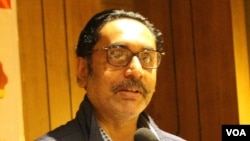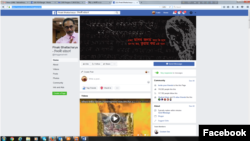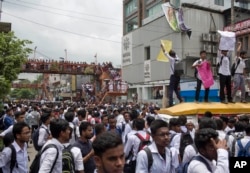A prominent social media activist and blogger in Bangladesh has been in hiding for the past two weeks, saying he fears for his life after the country’s intelligence agency summoned him to “discuss certain issues.”
Pinaki Bhattacharya, a known government critic, says he got a call from the Directorate General of Forces Intelligence (DGFI) soon after a week-long rally of students demanding improved road safety ended in Dhaka and the government began rounding up many on charges of inciting violence during the mass protests.
The 51-year-old activist, who has over 153,000 Facebook followers, told VOA from an unidentified hideout that "pro-ruling party goons violently attacked the protesting students. They also attacked the journalists who were covering the protests. I think the government is angry with me because my Facebook and Twitter posts covered those attacks and revealed the political identity of the attackers.”
“Some men claiming that they were from the DGFI came to my home and office in search of me," he said. "I know many picked up by security agents in such way in the past, disappeared without trace. I am very scared.”
Bhattacharya, who is a medical doctor, is well-known in Bangladesh for his online activism.
He has long used Facebook, Twitter and his blogs to criticize the current Sheikh Hasina-led government for its alleged corruption and human rights violations, including enforced disappearances and extrajudicial killings. He has received many online death threats in the recent past.
Student protests
In late July he came out in solidarity with the mass protests held by the students demanding safer roads in Dhaka. Armed alleged pro-ruling party activists violently attacked the protesters and the journalists covering the rallies.
Bhattacharya used photos and videos of the attacks on the protesting students on Facebook and Twitter, seeking action against the attackers. However, the government announced that many were using protest-related photos and videos to “spread rumor” and incite violence and they would face action.
Soon after the security agencies began arresting social media users for “inciting violence,” Bhattacharya said he received a call on August 5 from a man who he said introduced himself as Major Farhan from the DGFI. He asked Bhattacharya to come down to the agency’s headquarters for talks on certain issues.
Bhattacharya did not turn up at the DGFI headquarters and went underground that evening.
“The case of Akramul Haque flashed in my mind immediately," he recalled. "I became very anxious about my safety. I have gone underground, fearing for my life.”
After Akramul Haque, a municipal councillor in Teknaf was killed in May, security agencies claimed that he was an armed narcotics dealer who died in a gunfight. But, in an audio clip reportedly recorded remotely by his wife via a mobile phone, Haque is heard saying he had met the “Major from the DGFI.”
Security forces deny actions
Prime Minister Hasina’s media advisor, Iqbal Sobhan Chowdhury, told The Telegraph (UK) last week that neither DGFI nor any other security agency was after Bhattacharya.
VOA called the telephone number from which Bhattacharya said he received the DGFI call. The person who answered, who would not give their name, confirmed it was the DGFI office, but said no one by the name of Major Farhan existed there. VOA was unable to get any further comment from DGFI.
From his hideout Tuesday, Bhattacharya said he believed the DGFI was still hunting for him.
“I fight for the rights of the people," he said. "I raise my voice against abuses committed by the powerful on the weak. I do what a human rights activist is supposed to do. I have not committed anything criminal or illegal. Yet they are hounding me and have forced me to remain underground.”
Phil Robertson, deputy director of Asia Division of Human Rights Watch said Bhattacharya was right to be afraid because Bangladesh's security and intelligence forces have a long history of torture, enforced disappearances, and extra-judicial killings and operate with near total impunity.
“The government should order the DGFI to stand down and leave Pinaki alone because all he's done is use his right to freedom of expression on social media to reveal abuses and call for reforms,” Robertson told VOA.
Hong Kong-based activist Mohammad Ashrafuzzaman, liaison officer of the Asian Legal Resource Centre (ALRC), said DGFI actions such as calling a citizen for a meeting or raiding his home or workplace in search of him amount to a threat to one’s life and are completely illegal.
“Even in the case of having a criminal case against a person," he said, "the DGFI does not have any legal jurisdiction to get involved. Even if Pinaki Bhattacharya had been an accused in any criminal case, it would have been the business of the police to be after him, not the DGFI.”






